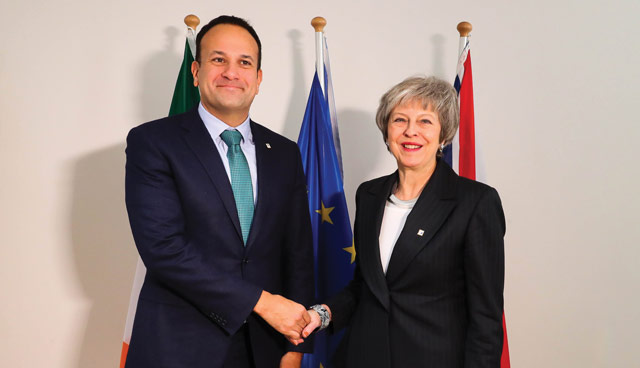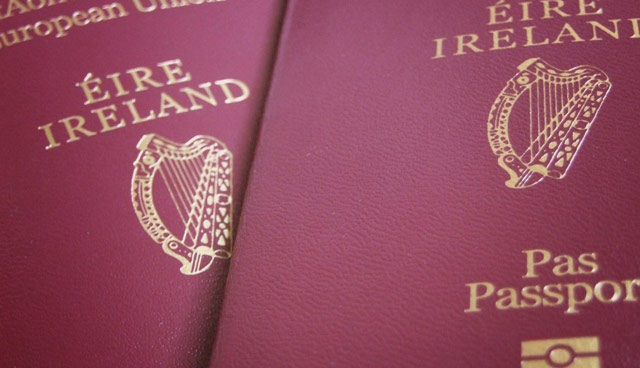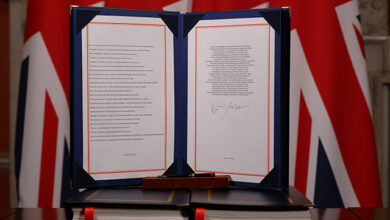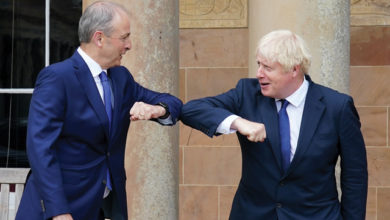Rights post-Brexit

In 2017, Taoiseach Leo Varadkar, speaking directly to Irish citizens living in Northern Ireland, declared “you will never again be left behind by an Irish Government”. However, with no UK solution on the table, many of those citizens recognise considerable gaps emerging in their legal protection.
Speaking in the context of ongoing Brexit negotiations, Varadkar stated that the birthright of people born in Northern Ireland to Irish citizenship, and therefore EU citizenship, would be protected, adding that there will be no hard border in Ireland.
Almost a year later, Varadkar highlighted the interests of Irish citizens living in Northern Ireland as a “priority” within ongoing negotiations between the EU and the UK, and yet an all-encompassing bilateral agreement between Ireland and the UK to protect the rights of Irish citizens and Irish passport holders remains absent.
The Good Friday Agreement recognises the “birthright of all the people of Northern Ireland to identify themselves and be accepted as Irish or British, or both, as they may so choose, and accordingly confirm that their right to hold both British and Irish citizenship is accepted by both governments and would not be affected by any future change in the status of Northern Ireland”.
Enhanced rights of Irish citizens in the UK predate the European Union but the legal framework for many of these rights do not. While the Common Travel Area (CTA), created in 1952, provides a basis for citizens of the two jurisdictions to move and reside in either, as well as extending rights around areas such as employment, social benefits and some voting rights, it remains today as an informal agreement.
A recent report prepared for the Northern Ireland Human Rights Commission and the Irish Human Rights and Equality Commission by senior legal academics based in universities in England described the CTA as “written in sand”, adding that its terms are “much more limited than is often believed to be the case”.
As the academics point out there are a range of issues the CTA does not directly cover, such as:
- the movement of capital;
- provision of services; movement of workers;
- good transportation; or
- access to medical care or education.
As well, the CTA imposes no obligation upon members to extend a full range of civil and political rights to each other’s nationals. Instead, the CTA exists in law insofar as it is “provided for by domestic legislation” on core issues.
Created in the context of an EU including both the UK and Ireland, the Good Friday Agreement provided a legal basis for some of the rights enjoyed but many, such as those named above, were underpinned by EU law.
The British Government has given some recognition to the absence of a legal standing for some rights across Ireland. The EU Settlement Scheme, for example, which allows EU citizens in Northern Ireland to retain a number of EU rights, has legal basis within the withdrawal agreement.
However, with the withdrawal agreement subsequently rejected by parliament in Westminster and the prospect of no deal looming closer, there are concerns around rights.
The Irish Government claims it is working to address such concerns. The Government states that “Detailed work is at an advanced stage, both at home and bilaterally between Ireland and the UK, to ensure that all necessary provisions are made in both jurisdictions so that the CTA continues to function effectively. Both the Government of Ireland and the UK Government have committed to maintaining the CTA in all scenarios”.
However, critics have pointed to a Government focus on trade and, in particular, to ensuring no hard border, believing that other issues that will affect Irish citizens living in the North, such as access to healthcare, recognition of skills qualifications and even driving rights, have not been given the attention they require, although the Government’s omnibus Brexit Bill has sought to address some of those concerns.

In response to Varadkar’s pledge that Irish citizens in Northern Ireland “will never again be left behind by an Irish Government”, political columnist Brian Feeney recently told a Brexit conference in Belfast “you have already been left behind. The Irish Government, fixated with border and trade, have let the Irish citizens’ rights as EU citizens go to the wall”.
One example highlighted by Daniel Holder, deputy director of the Committee on the Administration of Justice (CAJ), is around the recent EU Settlement Scheme drawn up by the UK, facilitating EU citizens to continue living in the UK. Irish citizens are exempt from the scheme, however, any Irish citizen who ‘arrives’ in the UK after Brexit day will not have the option to retain EU rights, potentially creating an entitlement barrier between generations.
Holder argues that while the UK Government maintains that Irish citizens need not apply for the scheme, there may be good reason for doing so. One example is that legally, EU law and not the CTA enables Irish citizens to re-enter and reside in Northern Ireland, meaning Irish passport holders living in Northern Ireland are not legally protected to re-enter Northern Ireland if they leave. This, he argues, is a result of the UK never bringing its immigration and nationality laws in line with the GFA.
The Immigration and Social Security Coordination (EU Withdrawal) Bill was introduced in late 2018 to try and remedy this, however, other areas remain exposed.
These include areas of cross-border provision currently enjoyed such as schooling and education. As most EU citizen rights and benefits are dependent on residency in an EU member state, the use of the European Health Insurance Card (EHIC) or recognition of qualifications could be at risk unless legislated for.
Aspects of health and social care are mainly underpinned by EU rules and can be identified as falling under patient rights; provider rights and regulation and movement of goods. The withdrawal agreement stated its intention to maintain cooperation in healthcare across the Northern Ireland and Ireland border, however, there is a notable gap in the legal regime that actually supports cross-border health and social care between Ireland and Northern Ireland.
For example, cross-border care relies on Irish, UK and EU funding. If funding is removed, then policy decisions could see a move towards the removal of healthcare for non-residents in using domestic resources. While some cross-border care is currently funded by Irish and UK health authorities alone, a significant portion is made feasible by EU funding programmes. Without that EU funding, new policy choices on funding would need to be made in both Ireland and the UK to continue to fund healthcare for ‘non-residents’ using domestic resources.
Other areas in which EU law continues to underpin rights include employment, social security, policing justice and security.
MPs in Westminster have indicated their desire to see no deal taken off the table. However, there is no guarantee this will happen and the Government has indicated a switch of focus in preparing for a no deal outcome. However, without a legal framework between the UK and the EU, a question mark hangs over some existing citizen rights.
While both governments have indicated their desire to implement such an agreement, the future of Irish citizens’ rights remain unclear while a formal deal has yet to be agreed.





